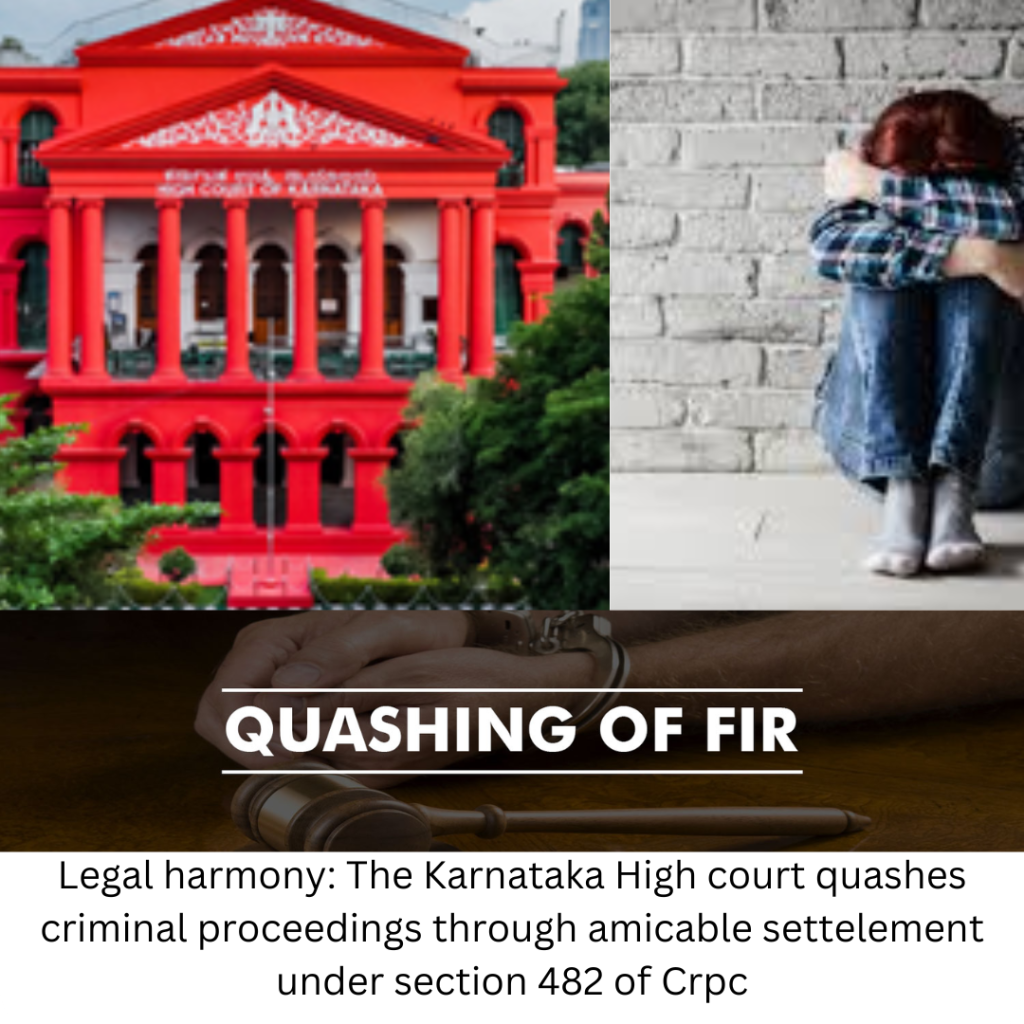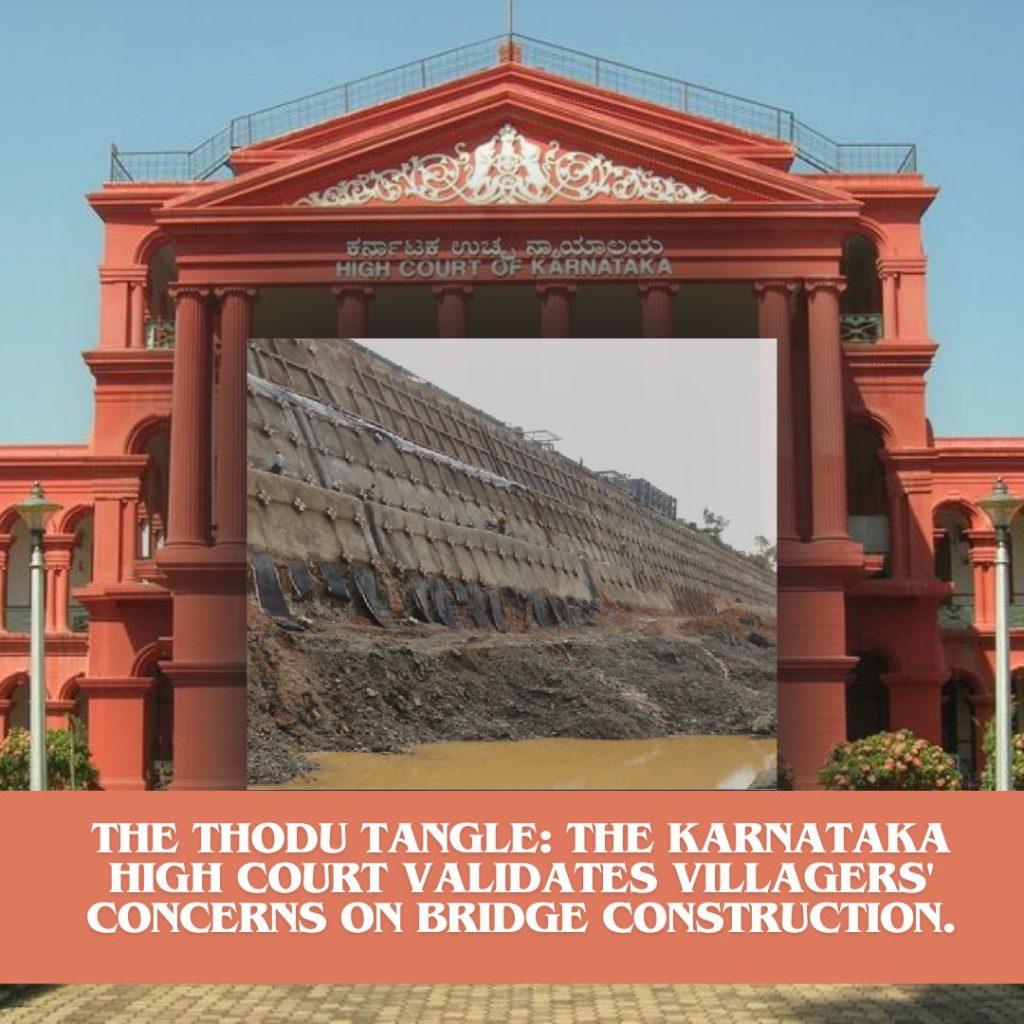Legal harmony: The Karnataka High court quashes criminal proceedings through amicable settelement under section 482 of Crpc
 Case Title: Ricky Vincent and others. V State of Karnataka and another
Case Title: Ricky Vincent and others. V State of Karnataka and another
Case No.: CRL.P No. 2400/2024 (482)
Dated on: 2 May 2024
Coram: HON’BLE MR JUSTICE V SRISHANANDA
FACTS OF THE CASE
Ricky Vincent and Smt. Dr. Neeraja S.J. got married on February 4, 2023 as per Christian rituals, but soon after there were serious differences in their matrimonial life leading to the complaint being filed u/s under Section 498-A of I.P.C. and under Section 3 and 4 of the Dowry Prohibition Act, which was registered in Crime No.38/2024 by the Varthur Police Station, Bangalore City on 18.01.2024. Subsequently The parties have settled the matter amicably. Marital tie has also come to an end by decree of divorce by the competent Court, and bringing the criminal case to a logical end was part of the compromise talks between the parties. Henceforth, this criminal petition was filed u/s 482 of the Code of Criminal Procedure with a prayer before the high court to quash the FIR in Crime No.38/2024 registered by Varthur Police Station under Section 3 and 4 of the Dowry Prohibition Act, 1961 and Section 498-A of the Indian Penal Code (IPC) in the interest of justice and equity.
LEGAL PROVISIONS
Section 482 of the Code of Criminal Procedure (Cr.P.C.)
This section empowers the High Court to quash criminal proceedings if it is satisfied that the continuance of the proceedings would be an abuse of the process of the court or if the ends of justice would be served by quashing the proceedings.
Section 3 of Dowry Prohibition act
Section 3 prohibits the giving or taking of dowry. It states that if any person, after the commencement of this Act, gives or takes or abets the giving or taking of dowry, he shall be punishable with imprisonment for a term which shall not be less than five years, and with fine which shall not be less than fifteen thousand rupees or the amount of the value of such dowry, whichever is more.
Section 4 of Dowry prohibition Act
Section 4 prohibits the demanding of dowry. It states that if any person demands, directly or indirectly, from the parents or other relatives or guardian of a bride or bridegroom, any dowry, he shall be punishable with imprisonment for a term which shall not be less than six months, but which may extend to two years and with fine which may extend to ten thousand rupees.
Section 498-A of the Indian Penal Code (IPC)
Section 498-A of the Indian Penal Code (IPC) deals with the criminal offense of cruelty by a husband or his relatives towards a married woman.
CONTENTIONS OF THE PETITIONERS
The petitioners argued that the parties had resolved their differences amicably, leading to the settlement and divorce. They contended that the continuation of the criminal proceedings was unnecessary and unjust since the dispute had been privately settled. The petitioners highlighted that the marital dispute was resolved through the intervention of elders and well-wishers. The complainant had agreed to the settlement terms, including ending the criminal case as part of the compromise.
CONTENTIONS OF THE RESPONDENTS
The respondent (wife) appeared before the court via video conferencing and expressed no objection to quashing the FIR. She confirmed that the criminal complaint’s quashing was part of the settlement agreement.
COURT’S JUDGEMENT AND ANALYSIS
After reviewing the material on record and the factual circumstances, the court noted that the parties had resolved their differences amicably, with the intervention of elders and well-wishers, leading to a mutual settlement and divorce. The complainant explicitly stated her lack of objection to quashing the FIR, indicating that this was part of their compromise agreement. The court concluded that the issues between the parties were trivial and had been amicably resolved. It decided that continuing the criminal proceedings would be unnecessary and unjust, given the settlement between the parties. The court recognized that the complaint involved offenses under Section 498-A of IPC and Sections 3 and 4 of the Dowry Prohibition Act, which are typically non-compoundable. However, in situations where disputes are private and do not affect public interest, the court can exercise these powers to prevent misuse of the legal process. The court cited the Supreme Court judgment in Ramgopal and another vs. State of Madhya Pradesh (2022) 14 SCC 531, which supports the quashing of criminal proceedings when parties have amicably settled their dispute. Hence the court allowed the Petition quashing of the criminal proceedings in Crime No. 38/2024 pending before the Additional Chief Judicial Magistrate, Bangalore Rural District.
“PRIME LEGAL is a full-service law firm that has won a National Award and has more than 20 years of experience in an array of sectors and practice areas. Prime legal fall into a category of best law firm, best lawyer, best family lawyer, best divorce lawyer, best divorce law firm, best criminal lawyer, best criminal law firm, best consumer lawyer, best civil lawyer.”
Judgement Reviewed by – PRATYASA MISHRA




